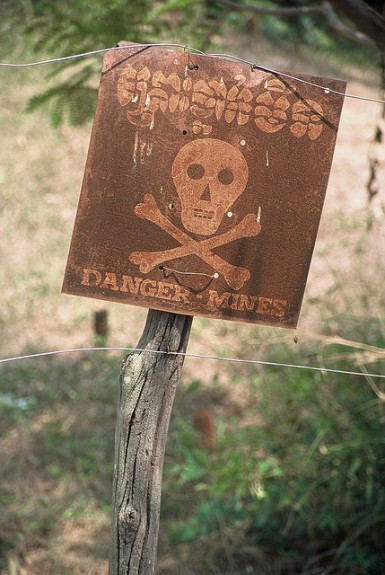Specially-Trained Honeybees Forage for Land Mines
With special training, these honeybees can sniff out TNT

Photo: Timmarec
In Croatia, scientists are working on a new way to detect land mines without risking lives, reports the Associated Press. Honeybees, the scientists say, have an incredible sense of smell, and with the right amount of prodding can be trained to sniff out TNT, the most common explosive used in land mines. In preliminary testing:
Several feeding points were set up on the ground around the tent, but only a few have TNT particles in them. The method of training the bees by authenticating the scent of explosives with the food they eat appears to work: bees gather mainly at the pots containing a sugar solution mixed with TNT, and not the ones that have a different smell.
A common technique in animal behavior training, the bees are taught to associate the smell of TNT with food. Once that association is firm, the bees can be turned loose in search of mines.
”It is not a problem for a bee to learn the smell of an explosive, which it can then search,” Kezic said. “You can train a bee, but training their colony of thousands becomes a problem.”
Bees, with their incredible sense of smell, light weight and ability to fly should be better candidates for mine hunting than other approaches. Mine decommissioning teams already use dogs and rats to hunt down mines. But, some anti-personnel mines are so sensitive that the weight of a pup can set them off. The bees’ training is still underway, says the AP, but if and when they’re ready the Croatian-trained bees will be able to flit from mine to mine without setting them off.
From 1999 to 2008, says the Guardian, 73,576 people reportedly died to hidden land mines or unexploded munitions. “Of these, around 18,000 were confirmed deaths – 71% of victims were civilians and 32% were children.” Aside from their destructive potential, land mines are also a psychological and social plight.
Landmines and cluster munitions have been described as “weapons of social cataclysm”, which perpetuate poverty and prevent development. They leave a legacy of indiscriminate civilian injuries and deaths, burden struggling healthcare systems and render vast tracts of land uninhabitable and unproductive. As Kate Wiggans, from the International Campaign to Ban Landmines and Cluster Munition Coalition (ICBL-CMC) says: “They keep poor people poor, decades after conflict.”
More from Smithsonian.com:
/https://tf-cmsv2-smithsonianmag-media.s3.amazonaws.com/accounts/headshot/smartnews-colin-schultz-240.jpg)
/https://tf-cmsv2-smithsonianmag-media.s3.amazonaws.com/accounts/headshot/smartnews-colin-schultz-240.jpg)